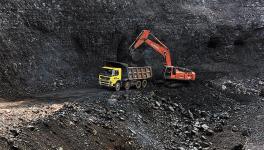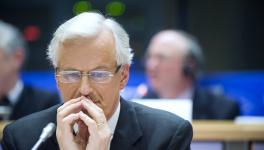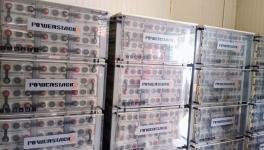As The Planet Wants to go Green, France Has a Nuclear Habit it Just Cannot Kick
The Tricastin industrial nuclear site, cooling tower of Eurodif uranium enrichment plant operated by Areva in Drome. Photo: CC BY-ND 2.0, Jeanne Menjoulet
On July 28, French President Emmanuel Macron landed in Tahiti and said that France owed a “debt” to French Polynesia. The debt was related to approximately 200 nuclear tests France conducted in the 118 islands and atolls that comprise this part of the central South Pacific, which France has controlled since 1842. These tests were conducted between 1966 and 1996. Macron did not apologize for the environmental and human damage caused by these tests. He remained stoic, acknowledging that the tests were not “clean.” “I think it’s true that we wouldn’t have done these same tests in the Creuse or in Brittany,” he said, referring to parts of territorial France. “We did it here because it was farther away, because it was lost in the middle of the Pacific.”
Of course, the people of these islands and atolls are not “farther away” from the sites where these nuclear tests were conducted. They live there and have suffered from the consequences of these tests. In 2006, Florent de Vathaire, a research director at the French National Institute of Health and Medical Research (Inserm), looked at the records from Polynesia and found direct evidence of—among other matters—thyroid cancer due to the nuclear explosions carried out by France. Unutea Hirshon, then president of the commission of inquiry of the French Polynesia Assembly, called upon the French government for “transparency.” France, she said in 2006, “has knowingly concealed the importance and extent of the radioactive fallout following the nuclear tests at Muroroa and Fangataufa.” Compensation has been minimal; justice has been absent.
Climate change and nuclear power
Throughout his tenure as president, Macron has said that the key to an “ecological future depends on nuclear power.” A few days before the opening of the 26th United Nations Climate Change Conference in Glasgow, Macron was asked to reflect on Europe’s crisis over rising natural gas prices (mostly sourced from Russia’s Gazprom). “It’s not about whether we are too dependent on a company or not,” Macron replied. “It’s about how to create alternatives. The only alternatives are to have European renewable energies and, of course, European nuclear power.”
Germany has to legally phase out nuclear power by 2022. But about half of the countries in the European Union (13 out of 27) continue to have a nuclear energy program. Of them, France generates half the nuclear electricity produced in all of Europe. The European Union does not set policy for nuclear energy beyond the European Atomic Energy Community treaty (Euratom), which was signed in March 1957 to allow for the peaceful development of atomic energy. There is little appetite in most of these nuclear energy states in the EU to decommission reactors. In fact, there is an increasing appetite for them to say that the transition from carbon-based fuel to “green” fuel should include nuclear power.
“There is no uranium in France,” Jean-Luc Mélenchon, the leader of La France Insoumise, a democratic socialist party in France, said to me. “We import it mainly from Niger and Kazakhstan.” One of every three lightbulbs in France is lit by the yellow-cake uranium from Niger, with the major chunk of the uranium ore coming from the mining sites in Arlit, which is around five hours north of Niger’s capital of Agadez. The town is a fortress of European mining companies, from Niger’s own government company to a series of French firms, most prominently Areva. The road out of Arlit is known as Uranium Highway. France’s armies have garrisoned the Sahel, “from Mauritania at one end to Chad at the other,” with France’s Operation Barkhane, which is its “counterterrorism” military operation (launched in 2014), headquartered in Chad’s capital of N’Djamena. War is what turns on the lights in France.
There is increasingly an echo between the nuclear tests conducted by France at Mururoa and Fangataufa between 1966 and 1996 and the military operations in Niger.
Getting out of nuclear power
Mélenchon will run in the presidential election against Macron in April 2022. Part of his campaign is to fight against nuclear power. The energy is not cheaper, he tells me. “The current price of nuclear electricity is already higher than many renewables,” he says. The cost of disposal and of water to cool reactors is immense and often maintained as externalities by power companies. Nuclear power, Mélenchon says, “is, like fossil fuels, an energy of the past.”
There are three methods to turn the tide, Mélenchon says: energy sobriety, energy efficiency, and renewable energy. Wind and wave power, as well as solar energy, are necessary options. “Getting out of nuclear power is not a technical but a political issue,” Mélenchon tells me. “It is a necessity. The alarming scientific forecasts on climate and on the nuclear threat demand it. We must start right away. No one invented electricity by trying to improve the candle. Radioactivity without danger does not exist any more than the candle without the flame.”
If Macron had taken the people of French Polynesia seriously, he might have learned that lesson.
This article was produced by Globetrotter.
Vijay Prashad is an Indian historian, editor and journalist. He is a writing fellow and chief correspondent at Globetrotter. He is the director of Tricontinental: Institute for Social Research. He is a senior non-resident fellow at Chongyang Institute for Financial Studies, Renmin University of China. He has written more than 20 books, including The Darker Nations and The Poorer Nations. His latest book is Washington Bullets, with an introduction by Evo Morales Ayma.
Get the latest reports & analysis with people's perspective on Protests, movements & deep analytical videos, discussions of the current affairs in your Telegram app. Subscribe to NewsClick's Telegram channel & get Real-Time updates on stories, as they get published on our website.
























